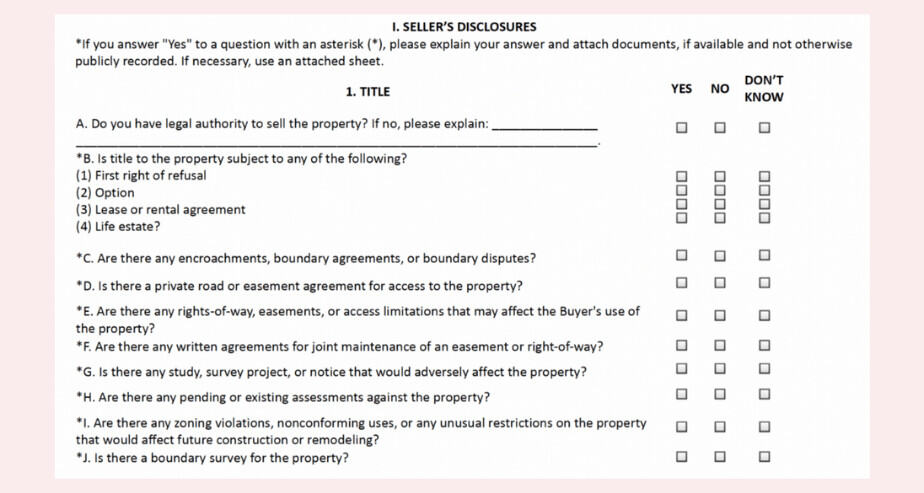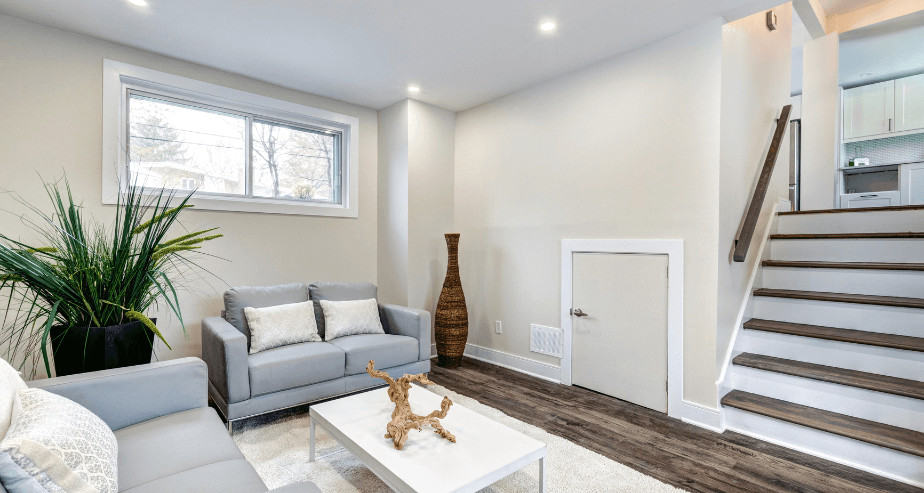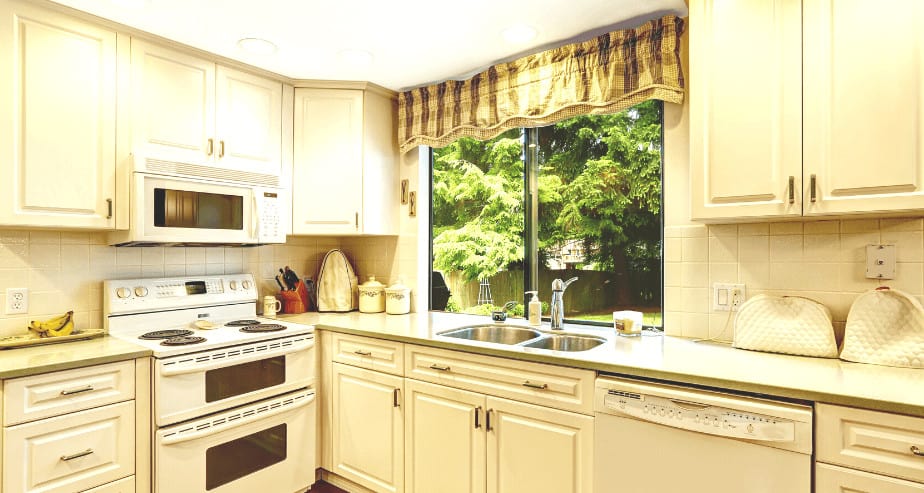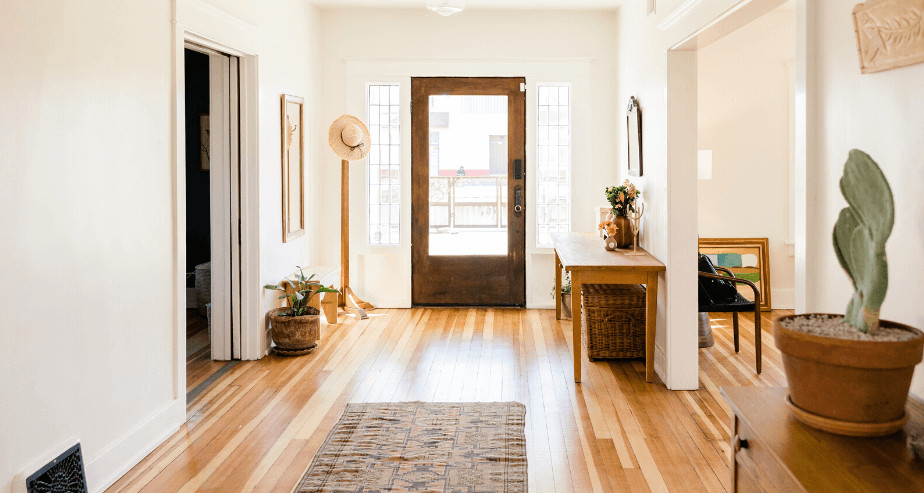If you’re a first-time homebuyer ready to start heading to open houses, you might be wondering what actually goes on at them and what you should do while you’re there.
You’re in luck, because we have plenty of articles here at Buying Your New Home all about open houses.
You’ll learn things like:
- When they are held and how to find them.
- Whether or not you can attend them without a real estate agent.
- How to get the most out of them.
- And plenty more info. that will help you become an open house expert.
In this article, we’ll let you know the 10 best questions to ask the listing agent at each open house. That way, you’ll be able to make informed decisions about the homes you’re touring.
A listing agent, by the way, is the real estate agent who has been hired by the owner of the home to help them sell the house. A buyer’s agent, on the other hand, will help you find and purchase your home.
Should you buy a house without a real estate agent? We don’t think so. And here’s an article that will explain why.

Let’s answer this question for you right up front:
Should you take up the listing agent’s time with questions? Especially if you’re not really interested in the house?
The answer is YES. It’s absolutely ok to ask the listing agent questions during the open house – even if you’re not planning on placing an offer.
This is how you’re going to keep learning about homes and about the housing market. Consider each open house like a classroom of sorts. The more you ask and interact, the better you’ll do.
Agents are usually more than happy to answer questions. Not only does it make for a better open house when they are engaging with people, but he or she wants to make a good impression on you and everyone else, as well.
There’s just one caveat: There will most likely be some marketing brochures and mls (multiple listing service) listing sheets on the kitchen counter as you walk into the open house and sign in.
Make sure to take one for yourself.
Those sheets will have plenty of information about the house right there in black and white. Information like the number of bedrooms and bathrooms; square footage; lot size; year built; etc. will all be included.
So although agents are happy to answer questions, one pet peeve many agents have is answering basic questions that are already on the sheets.
Another thing is you’ll also want to walk through the entire house and property and then circle back and ask the agent your questions. That way you’re not asking obvious questions that you can answer yourself once you go through the house.
For example, asking “Are the bedroom closets good sizes?”, before you actually walk through the bedrooms and see for yourself is not a good use of anyone’s time.
But after going through the house – circle back to the kitchen or wherever the listing agent is hanging out – and ask away!
Are You Meeting Your Real Estate Agent at the Open Houses?
If so, your own agent will fill you in and answer plenty of your questions as you go through the house.
He or she will also most likely start a conversation with the listing agent there to find out more about the house. Join in and ask any questions your agent might have missed.
Oftentimes, it’s a question that the listing agent doesn’t know the answer to right there and then. She might have to ask the seller later and then get back to you or your agent with the answer.

A Good Resource at Open Houses are the Disclosures:
Disclosures or ‘seller disclosures’ are multiple page forms that the seller fills out when they first list their house for sale. They are mandatory in some states.
These forms require the seller to go through the sheets and give information on things like the age of the roof and of all systems in the house; major issues and repairs made; insurance claims; upgrades; etc.
However, there’s usually a space next to each line in the disclosure forms that allow the seller to check ‘unknown’.
So as helpful as they are, the disclosure forms don’t always have every single bit of information potential homebuyers would like to have on the house.
Let’s dive into the questions. . .
Here are the 10 Most Important Questions to Ask at Open Houses
1. Can you tell me why the owners are selling the house?
Keep in mind that the listing agent is legally obligated to keep the seller’s personal life private. For instance, they can’t tell you it’s because the couple is getting divorced, if the owner’s have requested him not to.
But, oftentimes the owners are selling because of a simple reason such as these:
- Their family has outgrown this current home.
- They are downsizing. For instance, their children are now grown and they don’t need that much space.
- They are relocating to another area. This is often for a career opportunity or to move back with family, if they’ve been away for years, for instance.
- They are ready for a change.
Any conversation you have with the listing agent about this could give you some good insight.
On the other hand, if the seller’s are moving because they’ve been battling with loud neighbors for years, they don’t legally have to tell this to the listing agent.
So, take everything with a grain of salt and play detective as you tour the inside and outside of the home to look for your own clues of what’s going on with the house.

2. Why Has the Home Been on the Market this Long?
Remember above when I said you don’t want to take up the agent’s time with questions that are answered right on the listing sheet? This goes for asking her how long the home’s been on the market.
It’s right there on the sheet under DOM (days on market).
But, if the house has been on the market for more than a few weeks, you should be asking the agent why.
Again, take their answer with a grain of salt. Because their loyalty is with the seller and their main mission is to get the house sold.
So, a listing agent legally cannot lie about what’s going on with a house. But, when asked why it hasn’t sold yet, they don’t have to give every single detail. They are going to put a positive spin on their answer.
That’s why you need to think like a detective at open houses. Listen carefully to the agent’s answers to your questions. And look carefully as you go through every part of the house and yard.
Sometimes a house is just sitting on the market because the right buyer hasn’t come along yet.
In general, homes priced in the lower ranges get more traffic and sell quicker than homes priced higher.
This isn’t always the case. A million dollar home could sell right away. But in general, there’s simply more buyers in need of the $350,000 house than there are for homes priced over $700,000.
A house could be sitting a while on the market because the seller has a firm number in mind that he wants to get for it and isn’t willing to come down (yet).
Or it could mean that there are issues with the house that are turning buyers away. Potential buyers are not willing to pay that price for the house with those issues – or deal with fixing the issue themselves, for instance.
A leaky roof that’s at the end of its 30-year life is a good example. Or a tiny kitchen and awkward layout. There are tons of reasons why a house might not be selling and an owner isn’t willing or able yet to go down in price.
The Home Inspection Period:
The listing agent might tell you that they had accepted an offer, but then the buyer changed their mind during the home inspection period. This is another telltale sign that there could be major issues with the house.
Unless they’ve waived the home inspection (which I don’t recommend) buyer’s hire an inspector to go through the house with a fine tooth comb. This is done within a few weeks of their offer being accepted.
Within this home inspection time period, a buyer has the legal right to walk away if she doesn’t like what the inspection uncovers.
Sometimes buyers are just overwhelmed by all of the small issues the home inspector found with the house. So, they decide to walk away from the deal.
In other instances, the home inspector might have found a major issue with the house. It could have been something that everyone was aware of, but now the inspection shows just how extensive the problem is. And just how costly it could be to fix.
That’s when buyers have to decide on these 4 things:
- Try to renegotiate the price with the seller. (Unless the house is being sold ‘as is’.)
- Try to negotiate with the seller to pay for the repairs or split the cost.
- Take care of the issue themselves once they move in.
- Walk away. Get their deposit back. And start looking for another home.
If a house is being sold ‘as is’ it means the seller will not pay for or fix any issues.

3. Have You Had Any Offers Yet?
The answer to this question will give you some insight into the activity level of the house.
If the agent says they’ve gotten plenty of offers already, that’s a good sign. It means buyers have gone through it and essentially like what they see.
This could mean the price is reasonable; the issues are minimal; and there are many attractive features to the house.
On the downside, it could also mean that if you were to place an offer, you’ll be competing against many other buyers. So your offer has to be a good, competitive one.
4. When Are Offers Due?
Right now as I’m writing this article, it’s still a seller’s market out there, like we’ve been having for the past few years.
That means home sellers have all the advantages over home buyers.
One of the reasons is there’s simply not enough houses to go around. So, buyers have to compete against each other for the few homes that are on the market.
If you’re new to home shopping, you might also be surprised at how fast some homes are selling.
You could be at the open house on a Saturday and the offers are due Monday by noon or 5:00 p.m. That’s not a lot of time to make a decision about the biggest purchase of your life.
But, it’s the way the market is, so you just have to go along with it.
You have to get used to gathering as much information as you can on a house that you like. Then you have to make some quick, but informed decisions like what price you want to offer the sellers for it. Then you have to work closely with your agent to get a good, solid offer in by the deadline.
All within a matter of a few days sometimes.
If you’re wondering what the average number of offers is that homebuyers make before getting one accepted – it’s around 5.

5. Is This Home a Flip?
A flipped house is one that an investor bought to fix up and resell. And flipped homes come in all different degrees of quality.
There are some investors who will do really shoddy work on a house. As you walk through it and start noticing details, you might even wonder if the contractors who did the work needed glasses – lol! Sometimes the renovation work is just so sloppy.
These investors often come in and slap a coat of paint on all the walls, replace all the flooring with the cheapest quality product they can find, and never take care of the important things like a new furnace, water heater or windows.
Then there’s other flippers who will meticulously go through a house renovating every little detail. These investors often hire a home stager to add finishing touches and give buyers an inspiring vision of what the house will look like if they buy it.
If the listing agent says yes that the house is an investment property, you now have to play detective to find out if it’s a good flip or a really bad one. Or something in between.
How can you tell it’s a bad flip? Here’s some signs:
- Cheap kitchen and bathroom cupboards and fixtures.
- Cheap flooring.
- Plenty of fresh paint on the walls. But sloppy work.
- Unfinished work throughout.
- Piles of trash and building materials not taken care of. Sometimes hidden away.
- Old windows, old roof, old furnace, or other major house components not replaced.
- Details not taken care of like rods and shelving in closets.
If you’re brand new to home shopping – don’t worry. The more open houses you go to, the more you’ll become somewhat of an expert in spotting things like major issues with a home and bad flips.
Your eyes will start getting drawn to all of these details.
6. Have You Dropped the Selling Price?
The listing sheet will usually say ‘price decrease’. But, it’s good to ask why.
Listen carefully to the agent’s answer. Try and figure out if the price has just dropped simply because the seller is ready to lower it and get it sold after not wanting to budge on the price. Or if there could be a bigger issue lurking.
This question is similar to the one above asking why the home has been on the market this long.
If you suspect there’s bigger issues lurking, keep the conversation going with the agent. That way, she might get really transparent with you on what’s been going on with the house.
For instance, did a buyer back out after the home inspection? If yes, ask her why, like I stated above.
The good thing is if a seller has dropped the price, they also might be willing to negotiate with buyers on taking care of issues that they previously didn’t want to.
A seller’s patience could be running out, for instance. Or they might have to sell the house by a certain date and time is now running out on them.
You possibly could be in a good position to negotiate a fair price for this house.
7. How Old is the Roof, Windows, Furnace, Oil Tank and Other Major Systems?
Before you ask these questions, look through the listing sheet and the seller’s disclosures to see if the answers are on them.
You don’t have to stop there, though. And remember I mentioned above that sellers oftentimes can just write ‘unknown’ on the sheets.
So ask the listing agent plenty of questions to dig deeper. These systems in a home are expensive. A new roof can cost $30,000, for example. Depending on the size and where you live.
And a roof that had been leaking could have caused a lot more problems. Water damage to ceilings and floors below the leaks and mold are two examples.
So find out as much as you can from your conversation with the agent.

8. How Long Have The Owners Lived in the House?
The answer to this question could give you clues to any issues with the house that aren’t included in the seller’s disclosures.
Let me give you an example: Say the seller says they’ve only lived in the home for three years. This is an unusually short time for a family to live in a home.
They could have suddenly gotten a dream job across the country. Or some other reason like this. But in general, homeowners don’t plan to stay in their home for only three years.
Could there be problem neighbors next door? Could a loud train pass nearby a few times a day? Could vandalism be a huge issue there?
Issues like this aren’t always disclosed. That’s where you need to play detective if you suspect anything unusual.
On the other end of the spectrum, the agent might say the owners have lived in the home for thirty years. This is great information as well. It means the home hasn’t been turned over several times through the years with new owners.
It could also mean that the owners have kept up with major issues in the house all through the years and the home just needs some cosmetic updating.
Oftentimes when owners have lived that long in their home, their children have grown up and out of the house – and they are now empty nesters ready to downsize.
Although it’s not your job to pry into a seller’s personal life, it is your job to find out as much information as you can about all the systems throughout it.
9. Does the House Need a New Septic System?
If the house is connected to town or city sewers, that’s great. No need to ask this question.
If it’s connected to town or city water, that’s another plus. Then, you don’t have to worry about a well. Although some homeowners prefer well water to municipal water.
But if the house has its septic system, it might need to be replaced with the sale of the house. And this could be expensive.
Every city and town has its own rules for septic systems in regards to a home being sold. So, this is an important conversation to have with the agent there.
Ask him whose responsibility it is to replace the system – the seller’s or the buyer’s – if it fails the inspection.
If you’re not familiar with the area, you can also ask him what the going rate is these days in the area for replacing a septic system. He might not be comfortable answering this, because rates can fluctuate a lot. But, it never hurts to ask.
Then, if you do end up placing an offer, make sure your own agent and real estate lawyer include any documents or wording in the offer that will protect you in any way possible from septic system issues with the house.

10. Is There Anything in Particular the Sellers are Looking for in an Offer?
If you’ve fallen in love with the home and are definitely planning on placing an offer, this is a great question to ask.
Your real estate agent will also ask this question of the listing agent herself.
Knowing what the sellers are looking for in an offer will allow you to really sweeten yours, if possible.
For instance, they might need a buyer who will allow them to find a new house before they can actually sell this one.
This is called a Suitable Housing Clause. Basically it means that if you place an offer on the house, you agree that the house will only be sold if and when the sellers find a new home.
This can be risky for buyers. It could actually mean that after giving the sellers 90 days to find a new home – they don’t find one and you have to walk away empty handed. You will get your deposit back. But, all that time will have been lost.
On the other end, a seller might need a buyer to be able to close fast on this house. The buying process usually takes 45 days from the time the offer was accepted. They might be looking for a buyer who can make this happen in 30 days, for example.
The seller just might need you to be flexible with dates throughout the homebuying process.
These are only a few examples of what a seller might be looking for in an offer.
So if you and your agent can find out any special needs the seller has – and be able to accommodate them – it will make your offer a strong one.
As you can see, asking the right questions at open houses will definitely make you an informed homebuyer.
Don’t be afraid to ask any of these ten questions above. Even if the listing agent is busy and you need to hang back and wait until the end of the open house to ask them.
Another good tip is to keep a notebook handy to jot down any information you find out about homes. Especially if you’re attending a bunch of open houses in one day.
You want to make sure you don’t forget important details the agent told you.
That way, when you go home and think about making an offer, you’ll be armed with all the information you need.
If you can really picture yourself purchasing the house – it’s totally worth your time and effort.
Can you think of any other questions you could ask at open houses?
Email me anytime with your answers.
Good luck!

